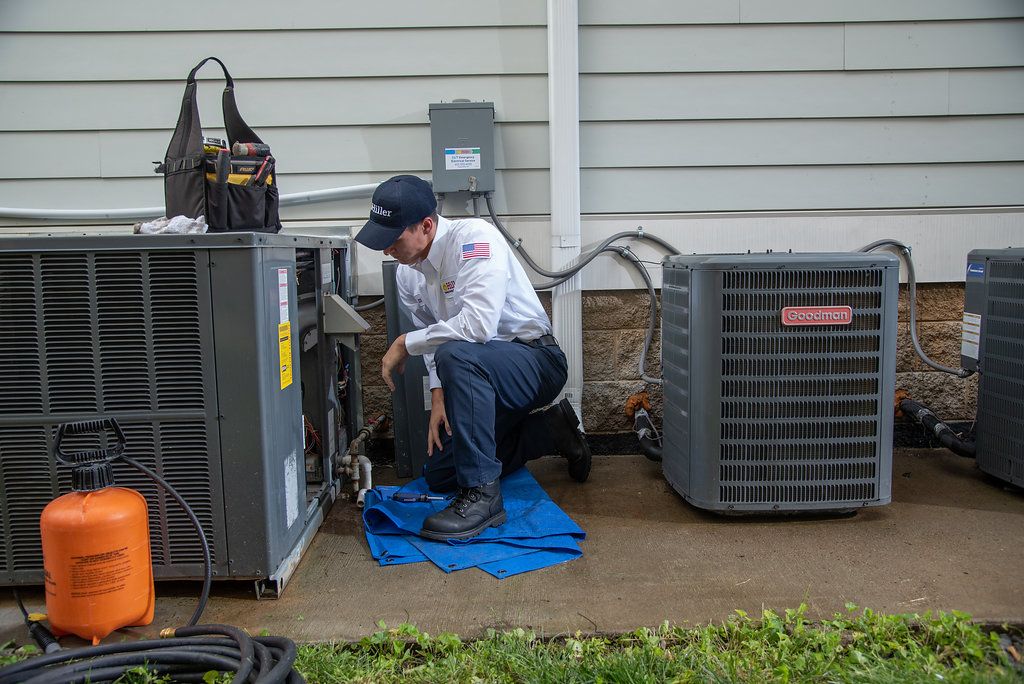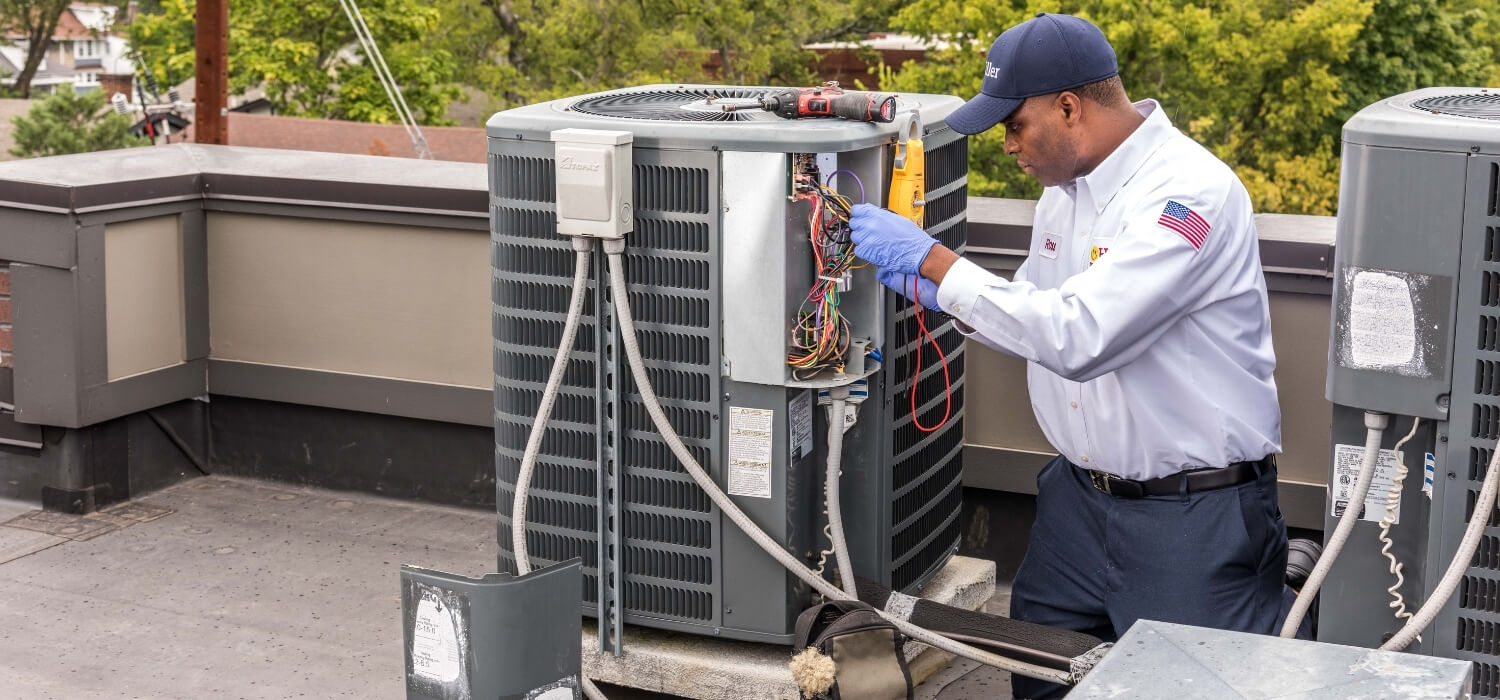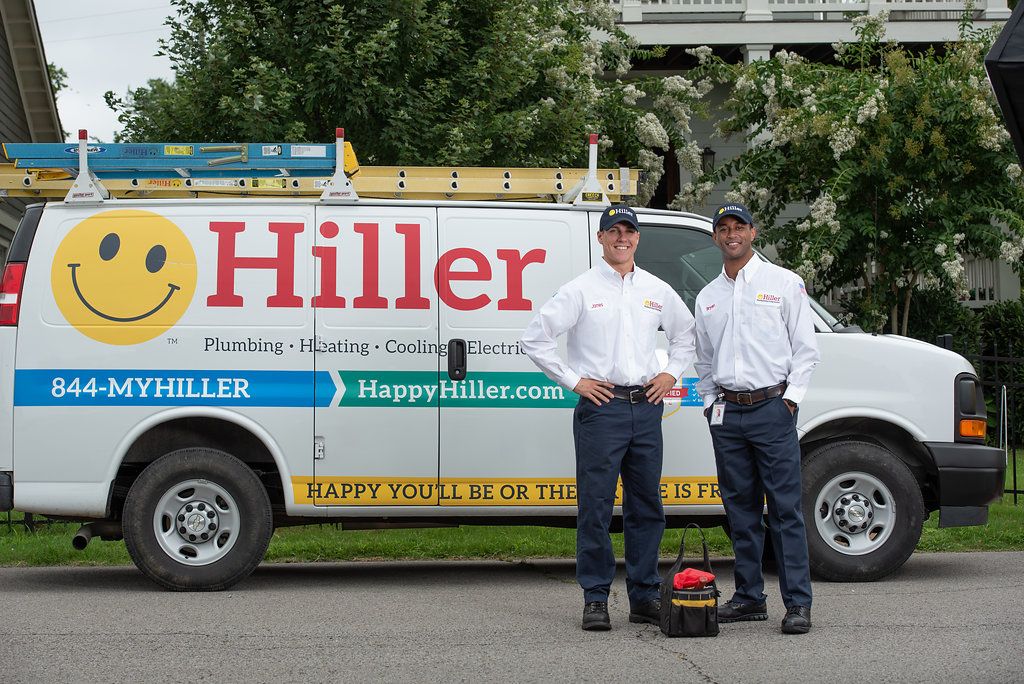The Ultimate HVAC Buying Guide
Enjoy reading the latest DIY articles and saving money?
Receive our latest helpful hints, tricks and savings, directly to your inbox.
Posted March 9, 2022
Buying an HVAC system for your home can be quite intimidating. Nevertheless, it is an important decision that’ll affect your comfort level and monthly expenses for years to come.
According to the U.S. Energy Information Administration, 87% of American homes are air-conditioned. Additionally, the vast majority of these households use central air systems. However, few homeowners actually understand the nitty-gritty of their HVAC unit.
Buying a new air conditioner or heating system is an important investment. So it’s crucial to do a bit of research before buying an HVAC system in order to accurately assess your wants and needs.Understanding the HVAC basics isn’t as difficult as it seems. We’ll walk you through the different types of models, and we’ll explain some helpful industry terms along the way. Once you’re finished reading, you’ll easily be able to determine which type of HVAC system to buy for your home.
Table of Contents:
What Is an HVAC System, And How Does It Work?
The Different Types of HVAC Systems Available to Purchase:
Factors to Consider When Buying an HVAC System
Speak With an HVAC Contractor Before Buying an HVAC System
What Is an HVAC System, And How Does It Work?
HVAC is an abbreviation for Heating, Ventilation, and Air Conditioning. This unit allows you to control the heating and cooling of your home, and it maintains your indoor air quality and ventilation.
An HVAC system consists of various components, such as:
- Air Conditioning
- Boilers
- Furnaces or Heat Pumps
- Air Purifier
- Dehumidifier
These elements work to perform three basic functions ﹘ heating, cooling, and ventilating. That’s why buying an HVAC system is such a crucial investment, as it will factor into your home comfort level for years to come.
HVAC Glossary
Before purchasing a new air conditioner or speaking with an HVAC professional, you’ll want to learn some common heating and cooling terms. The following words will likely come up as you research your new HVAC system and get quotes from any potential service providers.
Central Air Conditioner
This is the most common air conditioner in warm climates. It is connected to the ducts in the building, and a blower (fan and motor) will distribute the cool air through the ductwork system.
Condenser
This is the outdoor part of your air conditioner or heat pump that releases or collects heat, depending on the temperature and your needs.
Ducts
The air ducts in a house are pipes or tubes made of various materials (such as aluminum or steel) that connect your HVAC system to the vents in your home. Your system pulls air in through an intake vent and conducts the hot or cold air around your house. The term “ductwork” refers to this system in your home.
Furnace
This heating system uses gas combustion or electricity to produce heat. Most commonly, it is equipped with a blower that will distribute the heated air through your house. A furnace only produces heat. So if you also need air conditioning, it needs to be coupled with a central air conditioner to provide cool air when needed.
Heat Pump
These systems work in two directions. They’ll extract heat from the outside air and bring it into your home when you need heating. Or they’ll transfer the heat inside your home and push it outside as needed to cool your home. Heat pumps are one of the most energy-efficient systems currently available and will help reduce utility bills.
Thermostat
This device is common among modern HVAC systems. It allows you to control the temperature and programming of your system. Many thermostats allow you to program the heating and cooling patterns of certain zones of your home based on the time of day. Meanwhile, smart thermostats give you the ability to remotely control the temperature, which can aid you in reducing your utility bills.
With this glossary covered, we can now look in detail at each type of HVAC system.
The Different Types of HVAC Systems Available For Purchase
There are four main types of HVAC systems you can buy. Your choice will likely come down to your needs, the size of your house, and your budget.
- Split system: This HVAC unit is “split” between two main units ﹘ one for cooling and one for heating. This is the most common system in American households.
- Hybrid system: This is a more advanced version of the split system. It is equipped with a hybrid electric heater system for better energy efficiency.
- Ductless system: This is suitable for buildings that do not have a standard duct system. It is generally composed of an outside air conditioning unit and a heat pump.
- Packaged system: This option offers heating and cooling ability within one unit. It is most commonly used in houses with no basement as it is commonly installed outside.
Below, we will look at each of these HVAC systems in detail and explore their pros and cons. Then, you’ll have a full arsenal of heating and cooling knowledge before buying an HVAC system.
Split HVAC System
How It Works
This unit utilizes two major components ﹘ one to cool air and another to produce heat for your home. Generally, this will entail an indoor unit like a furnace and an outdoor central air conditioning unit.
A split HVAC system with a central air conditioner and a furnace is the most common combination. This type of unit uses blowers to circulate air through the ductwork.
Heat pump split HVAC systems can also be used in warm climates, where winter temperatures are rarely below freezing. These models are very energy-efficient, as the pump absorbs ambient heat.
Pros:
- Common (required ductwork already exists in many homes)
- Cost-effective pricing for properly equipped homes
- Energy-efficient in neutral climates
Cons:
- High upfront cost if ductwork needs to be installed
- Odors may disperse around the house
- Possible dust circulation
Hybrid HVAC System
How It Works
A hybrid HVAC system is similar to a split system in the regard that it uses ducts to transport air through your house. However, it also provides the option to use different sources of energy to heat your home. It is generally equipped with a furnace and a heat pump; this is why they are also referred to as “dual fuel systems.”
Hybrid units are extremely efficient and give you the option to use the most cost-effective energy at any given time.
Pros:
- Elite energy efficiency
- Lower utility bills
- Great heating capacity
Cons:
- Higher installation costs
- Need for possible ductwork installation
Ductless HVAC System
How It Works
Also sometimes referred to as a mini-split system, this option consists of several independent units located in each room where heating or cooling is necessary. The units are mounted on the walls and connect to a compressor that’s typically located outside.
This HVAC system is a great solution for those who don’t often use every room in the house. Doing so allows you to reduce energy usage by only installing it in the areas where it’s most needed.
Pros:
- Easier installation
- Lower energy costs
- No ductwork installation charges
Cons:
- Higher installation cost
- Poor heating capacity
- Higher heating costs
Packaged HVAC System
How It Works
A packaged HVAC system’s main component is a combination unit with heating and cooling all in one. The singular large unit consists of a condenser, compressor, and furnace. These systems are often installed outside. However, you can also choose to have your unit placed in your attic, garage, or a storage area.
Packaged HVAC systems are most common in warmer climate areas, as the heat is produced with electricity. Therefore, these models are often not as powerful as other units. Notably, more advanced units allow dual-fuel use with gas and electricity.
Pros:
- Quiet
- Energy-efficient
- Affordable installation costs
Cons:
- Susceptible to damage (weather, accidents, etc.)
- Some models aren’t heat-efficient
Factors to Consider When Buying an HVAC System
Looking at the above, you might already have an idea of what type of heating and cooling system would best suit your needs. However, there are several other factors to consider before buying an HVAC system.
Capacity
You should consider a model that can cool or heat your home as needed. The commonly used unit to measure an HVAC system’s capacity is BTUs (British Thermal Units.)
Your contractor can help you determine what size of HVAC system is optimal for your home. They will analyze such as the size of the building, ceiling height, sun exposure, and insulation.
Climate
Your local climate plays an enormous role in the best type of HVAC system for your home. Contractors know which type of unit works best for your area and will be able to provide the best recommendation.
Efficiency
The most up-to-date HVAC systems have grown in efficiency over the years. There are three rating systems that can help you identify which one may be the most efficient for you. They are Seasonal Energy Efficiency Ratio (SEER,) Heating Seasonal Performance Factor (HSPF,) and Energy Efficiency Ratio (EER.)
Usually, the higher these ratings are for a given air conditioning unit, the less energy they will use to produce the same cold/warm air. However, particular ratings are more important in certain climates than the others.
Air Quality
Different HVAC systems will impact the air quality around your home. Some may reduce humidity, and others may improve air quality. Components such as air filtration systems or humidifiers will impact this, and some units will be better suited to these than others.
Warranty And Maintenance
There should be a warranty on your installation, whether on the components themselves or the installation work. Additionally, maintenance costs vary from model to model.
Explore the warranties and service plans your contractor offers when buying an HVAC system. The differences in coverage and maintenance could be the deciding factor on which system is the most cost-effective for you.
Price
Your budget is likely the most important factor when choosing the right HVAC system for you. However, you shouldn’t only focus on the upfront pricing of the unit itself. It’s crucial to consider installation costs, durability, and energy efficiency.
In the end, purchasing the right model for your home will likely be the best financial move for you in the long run.
Comfort
On top of having an efficient cooling unit, there are comfort details that you can also discuss with your contractor. For example, how much noise a system produces is an often-underlooked factor.
Programming is also another point you should consider. Can you pilot the thermostat remotely from your phone? Are there different zones of your house that you can heat or cool separately? These points will affect your comfort as well as the energy efficiency of your HVAC system.
Speak With an HVAC Contractor Before Buying an HVAC System
Now that you’ve got a handle on the HVAC basics, it’s time to start talking to contractors. Find a reliable HVAC company in your area to compare HVAC systems as well as installation and service costs. Soon you’ll be on your way to a more comfortable, happy home!
 Daily Promotion
Daily Promotion
$500 Off Tankless Water Heater
Upgrade your comfort and give back this season.
Get Promotion


